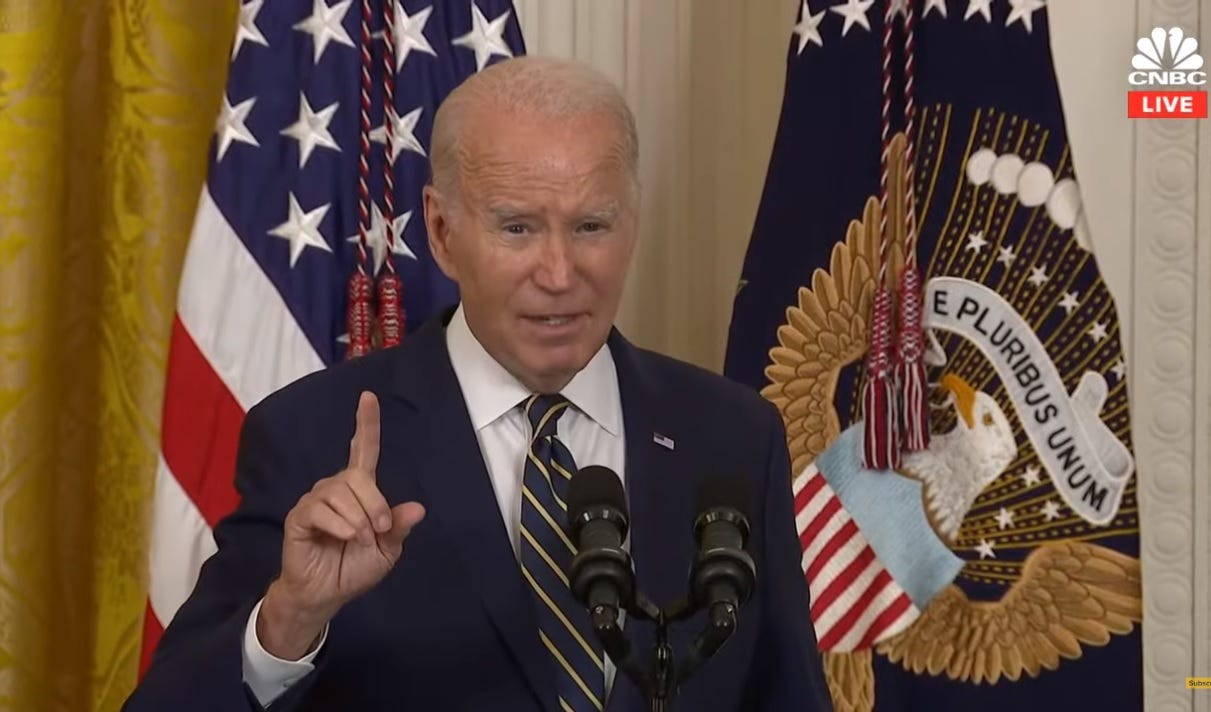Joe Biden From The Government And Here To Help, May Ronald Reagan Rot In Hell
Proving government can work well, for millions of Americans at a time.
You know how we bet Joe Biden would like his presidency — ideally, two terms of it — to be remembered? How about this: as the antidote to Ronald Reagan and decades of antipathy to the very idea of governing. Reagan railed against Big Government so much that not only did he destroy much of the social safety net, he even roped Democrats into the same destructive beliefs, with Bill Clinton infamously slashing welfare and other antipoverty programs and proclaiming that the “era of big government is over.”
Funny thing: Poor people didn’t all become venture capitalists. Families kept going bankrupt because of medical debt.
But because everyone hates long lines at the DMV or has struggled to fix a bureaucratic screwup, far too many dopey Americans believed Reagan when he insisted that "The nine most terrifying words in the English language are: I'm from the Government, and I'm here to help." Republicans and centrist Democrats happily got to work dismantling and privatizing government services, the corporate vultures flocked, and oops, the American Middle Class, unions, and public education got eated.
Clinton was unable to pass a universal healthcare plan because the insurance industry’s “Harry and Louise” ads scared Americans into loving insurance company bureaucrats. Republicans called for “market based” reforms, but when Barack Obama introduced a market based plan, suddenly it was socialism and government death panels. Again, we were supposed to prefer for-profit death panels.
Which brings us to Biden’s announcement Tuesday that his administration is preparing a rule to fix a problem he’s brought up in two State of the Union addresses: Insurance companies, those benevolent do-gooders, still treat coverage for mental healthcare and drug addiction treatment far differently from coverage for physical healthcare, despite a 2008 law that required insurers to cover them all equally — and even after Congress beefed up the law in 2020.
Worse, people who have coverage often find it does them little good because they can’t find a provider in the insurer’s network, or because in-network providers have months-long waiting lists. At the White House event announcing the new rule, Biden was introduced by Sen. Debbie Stabenow (D-Michigan), who’s worked on this issue for years, and by Rachelle Keyes, of the National Alliance on Mental Illness, who had to fight to get her insurance company to cover her 15-year-old daughter Katrina when she was in a severe mental health crisis.
The insurer covered Katrina’s hospitalization and crisis care, but she needed a specialist to help with her particular issues. The ideal therapist was out of network, but agreed to join the insurer’s network to help the family. The insurer denied the therapist’s application again and again, saying it had plenty of therapists — just nobody who could help her daughter. (Katrina saw the therapist out of network, and is now “thriving” — but only after great expense.) We’ve cued up the video to Ms. Keyes’s story.
Biden called attention to the need to just for godssake treat mental healthcare as healthcare:
“I don’t know what the difference between breaking your arm and having a mental breakdown is. It’s health. There is no distinction. […]
“You know, we can all agree mental health care is healthcare. It is healthcare. It’s essential to people’s wellbeing and their ability to lead a full and productive life, to find joy, to find purpose, to take care of themselves and their loved ones.”
And so the administration is developing a rule to close those gaps in mental healthcare coverage.
Even though the law mandates equal coverage, people who have insurance are twice as likely to see an out-of-network provider for mental healthcare as they are to go out of network for physical healthcare. There’s not only a financial cost to that:
“As a result, folks with depression, anxiety, post-traumatic stress, bipolar disorders, eating disorders, addiction, and other illnesses often go without care. Period. And you know how that ends, many times.
“They try to power through and hope that they can manage on their own. Or they pay whatever it takes, spending down their savings, racking up credit card bills, or taking out second or third mortgages to get the care for themselves or their children.”
Biden’s going to fix that, with a new Health and Human Services rule that, as NPR explains, will 1) require better data reporting on mental health care from insurers, to prove they really are providing parity; 2) prohibit insurers from using practices like preauthorization or narrow provider networks to limit care, or to pay claims differently; and 3) close a loophole that allowed health plans for state and local governments to opt out of the 2008 parity rule. Fixing that will make sure that “about 200 health plans serving 90,000 people will get the coverage.”
It’s that last bit that really highlights a key part of Biden’s approach to governing, and Crom help us, here’s a sports metaphor: Joe doesn’t just pursue home runs that will bring the crowd to its feet; the administration also concentrates on base-running, getting that lead off the plate that will move a runner — or 90,000 Americans — to the next base.
To be sure, Biden has also swung for the fences, winning great big legislative packages that will address huge problems, like all the infrastructure, climate and energy items in the Bipartisan Infrastructure Law, the CHIPS and Science Act, and the Inflation Reduction Act.
But in addition to great big initiatives like that, much of what the Biden administration has accomplished has focused on getting into the machinery of government and fixing little headaches that have bedeviled people for years, even decades. Last fall, for instance, the administration fixed a weird glitch in the Affordable Care Act that kept roughly a million Americans from being able to actually get affordable insurance through the ACA exchanges.
And while the Supreme Court swatted down Biden’s Big Goal of large scale student loan debt forgiveness, his Education Department has nonetheless fixed all sorts of student debt headaches affecting millions of Americans, like clearing up the awful mess in the Public Service Loan Forgiveness program, where tens of thousands of teachers and other public servants never got the debt discharge they qualified for. That’s fixed now. Similarly, the Education Department has been steadily forgiving loans for people who were ripped off by those grifty for-profit colleges that were so beloved by Trump Education Secretary Betsy DeVos. That happened again just this week, as the feds announced that 7,400 students who attended a defunct for-profit college in Colorado will have their loan balances wiped clean, to the tune of $130 million.
And of course there was the recent correction to screwed up loans going back to the ‘80s, which brought debt relief to more than 800,000 old farts like me. Not everyone in the country, but over several more rounds (see our article for how to find out if you qualify), some three million Americans will have their debts eliminated or reduced — as Congress intended when it set up the loan program.
Ninety thousand people instantly qualified for mental health coverage. Eight hundred thousand people with a clearer financial future. Seventy-four hundred Coloradans not having to pay loans for a school that defrauded them. It adds up, and the sum is that Ronald Reagan was wrong, as if we didn’t already know that.
Joe Biden’s from the government. And he’s here to show you he can help.
[White House / ABC News / NPR]
Yr Wonkette is funded entirely by reader donations. If you can, please subscribe or make a one-time donation.








Maybe the solution is to not drown anyone, including government, in the bathtub. Yeah, I think crazy things sometimes.
Heck, I didn't even get into the part where Fox News's main takeaway was that Biden misread the teleprompter and said that "more than 100" people died from Covid in America, proving he is too senile to lead.
Also CNBC didn't turn off YouTube comments were all "Wow, the man who needs mental health care is calling for better health care? LOL suck it Biden"